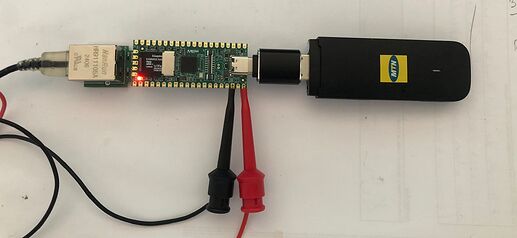I’m trying to make a Huawei e3372 usb dongle to work, I manage to add usb_modeswitch that will switch the dongle from data drive to network, the modem’s led does get fixed on, but no new network interface gets created. If I’m getting correctly from other forums, I’m missing the kernel modules for kmod-usb-net and cdc, but I cannot find them in the duo-buildroot-sdk compilation process, any suggestions?
Hi Argus
Can you run the command
lsusb
and share the output (with dongle attached to your milk v sbc?
Edit:
Can you also confirm which linux image you are using, provided output from dmesg after inserting dongle, and provide output from lsmod
Hello Johan, thank you for your reply. I build my image to include usb_modeswitch, but the basic information can be found bellow:
[root@milkv-duo]~# cat /etc/os-release
NAME=Buildroot
VERSION=20240702-2122
ID=buildroot
VERSION_ID=2021.05
PRETTY_NAME="Buildroot 2021.05"
[root@milkv-duo]~# uname -a
Linux milkv-duo 5.10.4-tag- #1 PREEMPT Tue Jul 2 21:19:43 CST 2024 riscv64 GNU/Linux
As requested, I have booted with the dongle already connected, so we have:
[root@milkv-duo]~# lsusb
Bus 001 Device 001: ID 1d6b:0002
Bus 001 Device 002: ID 12d1:1f01
And from dmesg, dongle USB LED flashing blue:
[root@milkv-duo]~# dmesg | grep usb
[ 0.220564] usbcore: registered new interface driver usbfs
[ 0.226340] usbcore: registered new interface driver hub
[ 0.231903] usbcore: registered new device driver usb
[ 0.855710] dwc2 4340000.usb: axi clk installed
[ 0.860488] dwc2 4340000.usb: apb clk installed
[ 0.865217] dwc2 4340000.usb: 125m clk installed
[ 0.870031] dwc2 4340000.usb: 33k clk installed
[ 0.874754] dwc2 4340000.usb: 12m clk installed
[ 0.879568] dwc2 4340000.usb: EPs: 8, dedicated fifos, 3072 entries in SPRAM
[ 0.887463] dwc2 4340000.usb: DWC OTG Controller
[ 0.892342] dwc2 4340000.usb: new USB bus registered, assigned bus number 1
[ 0.899621] dwc2 4340000.usb: irq 40, io mem 0x04340000
[ 0.915541] usbcore: registered new interface driver usb-storage
[ 1.007374] usbcore: registered new interface driver usbhid
[ 1.017222] usbhid: USB HID core driver
[ 1.022798] usbcore: registered new interface driver snd-usb-audio
[ 3.085299] usb 1-1: new high-speed USB device number 2 using dwc2
[ 3.324677] usb-storage 1-1:1.0: USB Mass Storage device detected
[ 3.334892] scsi host0: usb-storage 1-1:1.0
By the way, I have setup the USB to operate as OTG already:
[root@milkv-duo]/mnt/system# cat usb.sh
#!/bin/sh
echo host > /proc/cviusb/otg_role >> /tmp/usb.log 2>&1
So, after using the usb_modeswitch:
[root@milkv-duo]/mnt/system# usb_modeswitch -v 12d1 -p 1f01 -M "55534243123456780000000000000011062000000101000100
000000000000" -W
Take all parameters from the command line
* usb_modeswitch: handle USB devices with multiple modes
* Version 2.6.1 (C) Josua Dietze 2017
* Based on libusb1/libusbx
! PLEASE REPORT NEW CONFIGURATIONS !
DefaultVendor= 0x12d1
DefaultProduct= 0x1f01
MessageContent="55534243123456780000000000000011062000000101000100000000000000"
Look for default devices ...
found USB ID 12d1:1f01
vendor ID matched
product ID matched
found USB ID 1d6b:0002
Found devices in default mode (1)
Access device 002 on bus 001
Get the current device configuration ...
Current configuration number is 1
Use interface number 0
with class 8
Use endpoints 0x01 (out) and 0x81 (in)
USB description data (for identification)
-------------------------
Manufacturer: HUAWEI_MOBILE
Product: HUAWEI_MOBILE
Serial No.: 0123456789ABCDEF
-------------------------
Looking for active drivers ...
OK, driver detached
Set up interface 0
Use endpoint 0x01 for message sending ...
Trying to send message 1 to endpoint 0x01 ...
OK, message successfully sent
Read the response to message 1 (CSW) ...
Device seems to have vanished after reading. Good.
Device is gone, skip any further commands
-> Run lsusb to note any changes. Bye!
[root@milkv-duo]/mnt/system# lsusb
Bus 001 Device 001: ID 1d6b:0002
Bus 001 Device 003: ID 12d1:14dc
From dmesg, now dongle USB LED fix on blue:
[root@milkv-duo]/mnt/system# dmesg | grep USB
...
[ 889.424293] dwc2 4340000.usb: Not connected
[ 889.429408] usb 1-1: usbfs: usb_submit_urb returned -19
[ 889.530895] usb 1-1: USB disconnect, device number 2
[ 890.606660] usb 1-1: new high-speed USB device number 3 using dwc2
[ 890.820504] usb-storage 1-1:1.2: USB Mass Storage device detected
[ 890.821110] scsi host0: usb-storage 1-1:1.2
I should have a eth1, but it doesn’t show up, I guess I’m missing the kmod-usb-net and/or CDC.
[root@milkv-duo]/mnt/system# ifconfig
eth0 Link encap:Ethernet HWaddr 42:DD:24:B8:xx:xx
inet addr:10.1.1.117 Bcast:10.1.1.255 Mask:255.255.255.0
inet6 addr: fe80::4f9c:a254:a6cf:12c/64 Scope:Link
UP BROADCAST RUNNING MULTICAST MTU:1500 Metric:1
RX packets:7724 errors:0 dropped:0 overruns:0 frame:0
TX packets:2571 errors:0 dropped:0 overruns:0 carrier:0
collisions:0 txqueuelen:1000
RX bytes:1122262 (1.0 MiB) TX bytes:282687 (276.0 KiB)
Interrupt:25
lo Link encap:Local Loopback
inet addr:127.0.0.1 Mask:255.0.0.0
inet6 addr: ::1/128 Scope:Host
UP LOOPBACK RUNNING MTU:65536 Metric:1
RX packets:28 errors:0 dropped:0 overruns:0 frame:0
TX packets:28 errors:0 dropped:0 overruns:0 carrier:0
collisions:0 txqueuelen:1000
RX bytes:1934 (1.8 KiB) TX bytes:1934 (1.8 KiB)
My hardware setup is pretty simple, powering up by gpio, USB dongle with usb-c adapter.
Lastly, the output of lsmod:
[root@milkv-duo]~# lsmod
Module Size Used by Tainted: GF
cv180x_pwm 6983 0
cvi_vc_driver 879138 0 [permanent]
cv180x_jpeg 25220 1 cvi_vc_driver,[permanent]
cv180x_vcodec 28451 2 cvi_vc_driver,cv180x_jpeg,[permanent]
cv180x_tpu 32041 0 [permanent]
cv180x_clock_cooling 5953 0 [permanent]
cv180x_thermal 3404 0
cv180x_rgn 100809 0 [permanent]
cv180x_dwa 48669 0 [permanent]
cv180x_vpss 280938 0 [permanent]
cv180x_vi 338826 0 [permanent]
snsr_i2c 9341 0 [permanent]
cvi_mipi_rx 54306 0 [permanent]
cv180x_base 96472 7 cvi_vc_driver,cv180x_rgn,cv180x_dwa,cv180x_vpss,cv180x_vi,snsr_i2c,cvi_mipi_rx,[pe rmanent]
cv180x_sys 64161 6 cvi_vc_driver,cv180x_rgn,cv180x_dwa,cv180x_vpss,cv180x_vi,cv180x_base,[permanent]
Thanks for the help!
Hi Argus,
I think the issue is missing drivers, as you also mention. I don’t have an e3372 myself, but I recently had a similar issue with a USB WiFi adapter I was using a buildroot generated OS. I that case I had to configure buildroot to also build drivers for my wifi adapter. They were build as extra modules (output/target/lib/modules/[kernal version]/extra) and could then copy them to /lib/modules/5.15.118/extra/ on my device and then run depmod -a and modprobe [new driver]. After that I could confirm with dmesg that the new drivers were correctly loaded and my new network interface showed up correctly.
Unfortunately, I don’t know how exactly to configure buildroot to build drivers for the E3372.
I hope this is response can be of some help to you. Good luck!
Thanks for the reply. I’m still unsure how to build the driver, but I will keep searching.
Thanks!
